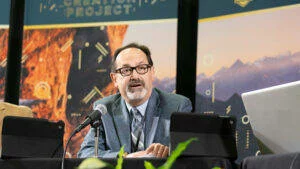No, Jack Collins–Professor of Old Testament at Covenant Seminary–has not decided to retire. At least I have no insider knowledge of anything of the sort. In a recent piece on Sapientia, though, Jack did suggest that the usefulness of genre has run its course. “Let’s send the word genre off to a comfortable retirement,” Jack declared in his piece, “Genre Has Run Its Course.” Let’s call this an argument for linguistic euthanasia: kill the word before it’s death becomes painful.
 But are these conclusions premature? After all, we’ve hardly begun what has been hailed the “language turn” in philosophy. Indeed, hasn’t genre in some sense saved the Word of God from our reductionistic modern impositions—impositions that are by no means abating? In a recent Henry Center Lecture, “From the Literal Interpretation of Genesis to the Doctrine of Literal Six-Day Creation,” Kevin Vanhoozer seemed to be making just such a case, arguing that we must recover “literal interpretation.” In that talk, he argued, with characteristic wit, that our culture has a serious case of LDL—not bad cholesterol, but “low discourse literacy.” Isn’t the recovery of genre an attempt to recover a truly “literal” (i.e., according to the letter) interpretation?
But are these conclusions premature? After all, we’ve hardly begun what has been hailed the “language turn” in philosophy. Indeed, hasn’t genre in some sense saved the Word of God from our reductionistic modern impositions—impositions that are by no means abating? In a recent Henry Center Lecture, “From the Literal Interpretation of Genesis to the Doctrine of Literal Six-Day Creation,” Kevin Vanhoozer seemed to be making just such a case, arguing that we must recover “literal interpretation.” In that talk, he argued, with characteristic wit, that our culture has a serious case of LDL—not bad cholesterol, but “low discourse literacy.” Isn’t the recovery of genre an attempt to recover a truly “literal” (i.e., according to the letter) interpretation?
Jack’s not necessarily disagreeing with his fellow reformed theologian, but the nuances might be easily overlooked. So, we at Sapientia decided to follow up with Jack about his provocative—if not slightly controversial—claim that we need to put the genre category to rest.
GHF: Jack, if I read your reflection correctly, your argument was in part a critique of Zondervan’s book on the genre of Genesis, but also—and perhaps primarily—of our confidence in the sure conclusions that can be made about genre and the supposed implications that can be drawn from those distinctions. Am I right in assuming that by “genre” you’re primarily referring to the literary form of a text?
CJC: Well, that’s actually the problem: What do we mean by our word “genre”? We might be talking of the literary form, or the style, or the purpose, or some combination — all without being clear on just what we are talking about. So, for example, is “history” a genre? What about “narrative”? I would answer that we need a more finely-grained terminology to help us.
GHF: So, how would you distinguish genre from literary form?
CJC: Some people would equate them. Genre as a classification has included other factors, though, such as the style by which the literary form is carried out — for example, both The Hobbit and The Lord of the Rings are in the literary form of narrative; they might both be classified as “fantasy narratives.” But their style or register is noticeably different — actually, the register of the opening chapter of The Lord of the Rings is continuous with that of The Hobbit, and then gets more serious and more elevated. I think the two works are aimed at different audiences: children can enjoy The Hobbit (as can their parents), but it takes more maturity to appreciate The Lord of the Rings. Both books foster a heart-level admiration for honesty and courage; but, by being a more serious kind of work, The Lord of the Rings engages us more deeply in reflections about our own values, and sets our honesty and courage into the context of the larger story of our culture and even of the whole world.
So Carolyn Miller’s suggestion invites us to consider the intended social setting by which an audience receives the text, and the kinds of things a text is intended to do to that audience. For example, a hymn, sung by a worshiping congregation, is a different kind of thing than a private devotional poem. If we classify them both in the genre “poetry” or “pious poetry,” we haven’t really helped users to understand how properly to use them, and what sorts of things to seek from them.
Is “history” a genre? What about “narrative”? I would answer that we need a more finely-grained terminology to help us.
GHF: You’re not saying that genre is useless, right? You’re only saying that it can’t do all the work that we’d like to think it can. Based on your Lewis-inspired criteria, and based on the kind of thing that Scripture is, in what way does sensitivity to genre aid biblical understanding?
CJC: What we have been trying to do with the notion of genre is right. Our problem is that the word allows us to treat separate factors without distinguishing between them.
GHF: What can’t it do?
CJC: Well, it’s less about what a word can or can’t do … after all, as Humpty Dumpty observed to Alice, the question is who is the master … but rather of what work we’ve been trying to do with the word.
GHF: Fair enough. But a master can’t make his dog fly. How are our efforts at mastering words an exercise in futility?
CJC: Right. My point is that the instrument is not as suited to the job as we need; we’re asking it to do too many things. The word “genre” just doesn’t allow us the proper kind of nuance, and our flexible use of the word masks this lack of nuance from us.
GHF: You say that the “problem” with genre is its “flexibility.” Most books fit within more than one genre. Why is this a problem? Isn’t this only a problem if we demand genre categories to be exclusive? Help me understand the problem, and what implications it has for our reading of Scripture.
CJC: If this were the only issue then your question would rightly imply that we can lighten up. But we should use a classificational term in such a way as to indicate the relevant kinds of differences. We should read Acts differently than we should The Lion, the Witch, and the Wardrobe — even though both are edifying narratives. But the classification “narrative,” or “edifying narrative,” doesn’t really enable me to know how to treat them differently. When we say that Acts is Scripture, we mean (or should mean) more than we trust its contents; we mean that it is intended to be read aloud in church, and to supply a key part of the story that shapes our present lives. That means that questions of whether the events in Acts really happened matter more to us as well.
GHF: Can we expand upon one of your contemporary examples? You use the example of Winnie the Pooh. Pooh fits into the genre of fantasy and children’s literature, and possibly others as well. Do I rightly understand your point to be something like this: We know the genre not because it takes some specific literary form (e.g., narrative), but because of a wider set of issues, including the text’s social function. Can you help us slower learners out by explaining your Lewis-insight with the example of Pooh? There’s more than one genre: so what?
CJC: “to know what it is — what it was intended to do and how it is meant to be used.” The sacred Pooh stories serve to entertain us; that is their purpose, and they do it well (for me, anyhow). They are most suitably read aloud to one’s spouse and children. Serious conflict and danger are absent. The Narnia stories also entertain, and are best read aloud to spouse and children, but they also probe more deeply into conflicts, motives, dispositions, and worldview. Both have talking beasts; both presuppose, and sometimes illustrate, the rightness of benevolent and wise human leadership over the beasts. But the Narnia stories are more deliberately “religious.” The difference between them, then, is not literary form, nor even imagined setting of use; but rather of what they aim to do to their audience.
GHF: Presumably, your point is similar about Genesis?
CJC: Yes. We really need to consider how Genesis was meant to be used in Israel, and what it was to do for its audiences. And as part of the Pentateuch it was to be read aloud in the public worship of Israel, to help its audience define who they are and how they should lean into the world, what sorts of things they should like and dislike. To say that it comes in the form of narrative is not enough — after all, the style and register of the narrative changes as we proceed, and the ratio of narration time to elapsed time shifts dramatically once Abram is one the scene (a lot more verses of narration for much shorter stretches of time). The features help us to know what we should be looking for in the different parts of the book. Various scholars (both critical and fundamentalist) have suggested that identifying Genesis as “narrative” is all we need for grasping its intention; but that suggestion is literarily clumsy, and obscures more than it clarifies, because it takes no account of the variation within the book.
GHF: OK, here’s my penultimate question. I’ve been focusing primarily on your negative argument. But you also make a constructive proposal. Am I right in understanding your primary concern to encourage us to think more comprehensively in our view of what a “text” is? Can you tell me a little more about this larger proposal, and why you think it’s so important?
CJC: With a “text” (spoken or written), an author aims to do something: sometimes to convey information, more often to evoke enough of the information to shape dispositions and encourage actions. (The way in which the information is used, and what things the audience are to affirm, is also important, but needs a separate discussion.) And these dispositions and actions are to become part of a community’s identity: To answer “Who am I,” one needs to begin with “Who are we?” So readers must be asking (especially of the Bible), “What is this text enlisting us to like and dislike, to aspire for, to do? How do I play a role in the body of God’s people in fostering our cooperation with it?”
GHF: As a student of Kevin Vanhoozer’s, I couldn’t let a mere “text” have the last word … after all, Scripture isn’t just any text, but it’s the Word of God. You emphasize the importance of knowing what something is before we can judge it. In your proposal, what difference does the fact that Scripture is the Word of God make (besides the fact that it is not merely judged, but also judging)?
CJC: Neither I nor Lewis would encourage anyone to “judge” the Bible, in the sense of setting ourselves over it! Lewis’s sentence opens a book on “literary criticism” of a poem, Milton’s Paradise Lost. For such a setting, one can “judge” a work of art — understand how it works, what its aims seem to be, and whether it achieves its apparent aims — so it includes interpretation and evaluation. The evaluation might include evaluation of whether its aims are worthy — that is, of the contents. So the word “judge” there needs to be transposed when we apply the ideas to our approach to the Bible. The Biblical authors invited their audiences to trust that their aims were indeed worthy (though we might have to work our way through our doubts and questions to this confidence), and to ascertain, then, what those aims were.






Comments
Be the first one to make a comment!